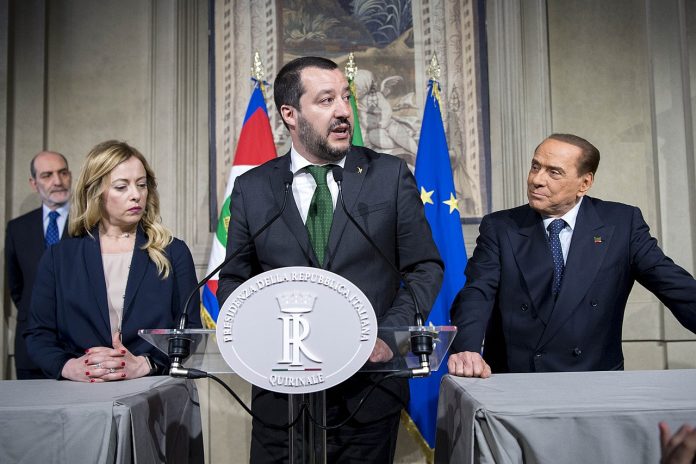Two far-right parties are poised to win the majority of seats in the Italian parliament in the next general election scheduled for 2023. This is based on the findings of the latest public opinion polls.
The Brothers of Italy of Giorgia Meloni received 21% of support – emerging as the country’s most popular political party. The League of Matteo Salvini could take 20% of the popular vote, according to the poll. This situation could significantly impact the future of politics in Italy.
While the party of Meloni was formed from long processes of the neo-Fascist milieu, it is trying to create a new image of an ultra-conservative party. As such, it has introduced new strategies. Meanwhile, the League envisages incorporating the Forza Italia party in order to dominate the centre-right political environment.
European Interest had the opportunity to discuss these developments with Dr Valerio Alfonso Bruno. The conversation focussed on the rise of the two Italian far-right parties and their politics and ideological drivers. Valerio Alfonso Bruno is Senior Fellow at the Centre for Analysis of the Radical Right (CARR) and assistant to the Chair of International Relations at the Catholic University of Milan.

“Τhe strong populist and opportunistic element of the League under Matteo Salvini can co-habit well with the more ideologically oriented mindset of Brothers of Italy. However, this does not excluded a strong competition for the leadership of the Italian center-right coalition in light of Italy’s 2023 general election”, says Dr. Valerio Alfonso Bruno.
European Interest: The rise of the Brothers of Italy party was unexpected, and widely considered the successor of the Italian neo-fascism. In your opinion, was this another chapter of the political crisis that shocked the country in the 1990s or was it a consolidation of the society’s turn towards ultra-conservative values and ideals?
Dr Valerio Alfonso Bruno: I would say neither of the two. Berlusconi’s party Forza Italia can be considered the “last chapter” of the Mani pulite political crisis, that ended the so-called “First Republic” season. There are indeed analysts and scholars considering Brothers of Italy, and its rise, as the result of Italy’s turn towards ultra-conservative and nationalists values. However, I do consider that those values have always been somehow latent, at least for an important part of Italian society. As I explain in this recent piece, quoting Michele Serra reasoning, “Italy has never really come to terms with fascism”. For this reason, I consider the label neo-fascism more accurate than the one of post-fascist to describe Brothers of Italy.
How would you describe the party’s electorate? Has the party successfully penetrated the working class milieu like other far-right parties in the EU? Are the voters driven by conspiracy theories or anti-immigration, anti-Muslim or misogynist rhetoric? Perhaps they are COVID-19 sceptics?
Clearly there is a lot of that, and more, in Brothers of Italy electorate. However, the leadership of party has been able to build a well-conceived façade of respectability, depicting the party as “sovranista” (souverainist), in the frame of a classic right-wing conservativism. I would not be surprised if Meloni will also build on new narratives in the future. Scholars as Loveless and Downes have recently suggested radical-right parties in Europe have been introducing ‘newer’ far-right strategies to mobilise supporters, from eco-fascism to left-wing shift on economic positions. To this regards, generous social policies for “traditional” families could form the bulk of Brothers of Italy’s strategy, similar to what is currently happening in Poland and Hungary, as Mitchell Orenstein has argued.
Are there strong ties between the Brothers of Italy and the Italian Social Movement? Did the party distance itself from fascism and the neo-fascist legacy?
The ties are there and are strong, if you want to see them. It could be enough to look at the evolution of the logo of the party. However, as it emerges from Giorgia Meloni’s autobiographical book ‘lo sono Giorgia, le mie radici le mie idee’, a certain dose of political ambiguity is still compulsory. In addition, most Italian media and commentators like to downplay (neo)fascist schemata, as a comedy or even worse, a farce (with few exceptions, as for the brilliant analysis provided by journalist and writer Paolo Berizzi). Exactly the same mistake made some 100 years ago when fascism took hold in Italy, with most intellectuals considering it a transitory, even funny, moment. To this regard, I see much more commitment from outside Italy, with networks of scholars like CARR (Centre for Analysis of the Radical Right), led by Professor Matthew Feldman, whose motto is appropriately “Serious Issue. Serious Analysis”.
Female leaders are genuinely expressing strong leadership within radical-right and extreme-right parties. Again, would be a mistake to underplay that situation, as some past titles from important international media seem to suggest. Those parties are not softening their weltanschauung, which on the contrary is as radical as ever
The party has a female leader whose political appeal is constantly growing. But having a far-right female leader doesn’t seem to be an Italian prototype. French, German, and Finish far-right parties are led by women holding radical views. Does this mean far-right parties are loosening their gender policies or that appointing a female leader is just a part of their communication strategy?
I honestly don’t see this as a communication strategy. Female leaders are genuinely expressing strong leadership within radical-right and extreme-right parties. Again, would be a mistake to underplay that situation, as some past titles from important international media seem to suggest. Those parties are not softening their weltanschauung, which on the contrary is as radical as ever.
After the decline and dissolution of Alleanza Nazionale, the North League dominated the far-right field for nearly a decade. This party had a long and controversial evolution, from secessionism and anti-South rhetoric to the vehicle of core nationalist, racist and anti-EU policies to a party claiming today the leadership of the centre-right. How would you explain this permanent transformation?
The League under Matteo Salvini’s leadership has become an extremely pragmatic party, showing opportunism as in the case of the “patto di governo” of 2018, when the yellow-green executive was formed with the Five Star Movement or currently supporting Mario Draghi’s executive, having softened its Euroscepticism. However, all this pragmatism is merely tactical, not strategical, and will not pay forever: it exhibits a populist worldview or style, without a real supporting ideology. On the contrary, the ideological element is strongly present in Brothers of Italy (!): that is one of the factors making the party’s strategy working extremely well. At its peak, at the end of 2019, the League was polling at 33%, now it is given at less than 20% (which is not bad per se), while Brothers of Italy in the same period has moved from 12 to 21%, making it the first political party in Italy.
The League under Matteo Salvini’s leadership has become an extremely pragmatic party, showing opportunism as in the case of the “patto di governo” of 2018 … However, all this pragmatism is merely tactical, not strategical, and will not pay forever: it exhibits a populist worldview or style, without a real supporting ideology. On the contrary, the ideological element is strongly present in Brothers of Italy
According to the poles, the Brothers of Italy and the League (with the appendix of Forza Italia) will both win the majority of the seats in the parliament in the next general elections. Despite some differences in views, the Brothers of Italy and the League share several similarities. Are these similarities complementary or in opposition? How could this impact the country and its overall position in the EU?
The similarities will coexist well. As I mentioned above, the strong populist and opportunistic element of the League under Matteo Salvini can co-habit well with the more ideologically oriented mindset of Brothers of Italy. However, this does not excluded a strong competition for the leadership of the Italian center-right coalition (even if we should more appropriately label it a radical-right coalition, as I recently argued with Vittorio Emanuele Parsi) in light of Italy’s 2023 general election. An additional element of conflict could be the possibility of Forza Italia and the League to federate into a single party, in order to keep the leadership of the coalition. Yet, also in this case it remains all to see if that tactical move would work out in the long run.
Valerio Alfonso Bruno is Senior Fellow at the Centre for Analysis of the Radical Right (CARR), where he is deputy head of the Populism Research Unit and Fellow at the Center for European Futures. Bruno is assistant to the Chair of International Relations at the Catholic University of Milan and cooperates with the Observatoire de la Finance in Geneva. Bruno is currently working on a monograph on the populist radical right in Italy between 2018 and 2020, co-authored with J.F. Downes and A. Scopelliti, for Ibidem-Verlag/Columbia University Press.

